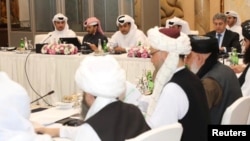The Taliban Friday ruled out participation in intra-Afghan negotiations until the United States signs an agreement with the insurgent group on the complete withdrawal of foreign troops from Afghanistan.
U.S. chief peace negotiator Zalmay Khalilzad paused peace talks with Taliban interlocutors in Qatar a week ago to give them time to consult with their leadership on reducing insurgent violence. The temporary suspension came a day after the Taliban attacked the largest U.S.-run military base, Bagram, north of the Afghan capital of Kabul.
However, the Taliban indicated Friday it does not intend to stop hostilities until securing a foreign troop withdrawal deal with the U.S.
“Intra-Afghan negotiations will begin only after an agreement with America on the withdrawal of all foreign troops from Afghanistan is signed,” tweeted Suhail Shaheen, who speaks for the Taliban negotiating team.
But top U.S. defense officials Friday gave no indication they were prepared to authorize such a comprehensive withdrawal.
“We have a mission in Afghanistan, that is to ensure that it never again becomes a safe haven for terrorists,” U.S. Defense Secretary Mark Esper told reporters at a Pentagon news conference.
“Until we are confident that that mission is complete, we will maintain a presence to do that,” he added.
Khalilzad visited Kabul earlier this week and held discussions with Afghan President Ashraf Ghani, politicians outside the government and civil society representatives.
“We discussed efforts to achieve reduced violence and pave the way to intra-Afghan negotiations… We’re approaching an important stage in the Afghan peace process,” Khalilzad tweeted on Thursday at the end of his two-day consultation. He did not elaborate further nor did he say when U.S.-Taliban talks would resume.
Taliban officials insist they don’t see the need for further negotiations with U.S. interlocutors because both sides have already negotiated a draft agreement after months of meetings and they just need to sign it in the presence of international guarantors.
The proposed document outlines the Taliban’s counterterrorism guarantees in return for a phased withdrawal of U.S. and NATO troops from the country. The insurgents would then immediately engage in talks with the Afghans to find a political settlement to decades of hostilities in the country.
President Ghani wants the Taliban to observe a temporary cease-fire and insists his administration will lead peace negotiations with the Taliban.
But the insurgent group so far has rejected calls for direct talks with the Kabul government, condemning it as an illegitimate entity and a “puppet” of America.
Shaheen insisted Friday that all Afghan sides will have their representation in the Taliban-Afghan negotiations when they begin.
“This has been our consistent stance and we have shared it with media time and again,” Shaheen added.
The Taliban has maintained negotiations with an inclusive Afghan delegation representing all political and ethnic groups in the country would also involve government officials but in their private capacity and not as envoys of Kabul.
The war in Afghanistan, America’s longest, has raged for more than 18 years, costing Washington nearly $1 trillion and the lives of around 2,300 U.S. troops.
The conflict has killed an estimated more than 150,000 people, including foreign troops, Afghan and Taliban combatants and Afghan civilians.
Uncertainty about the fate of peace talks comes as Afghan election officials say they are set to announce repeatedly delayed preliminary results of the September 28 presidential election in coming days. The Independent Election Commission announced on Thursday it has recounted and audited questionable votes in all 34 Afghan provinces.
President Ghani and his governing partner, Chief Executive Abdullah Abdullah, are the two front runners.




